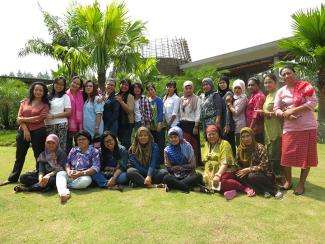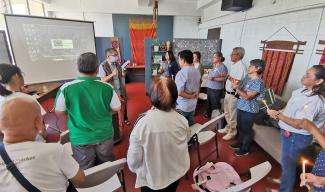The birth of Law No. 6 of 2014 on Village. This law was passed on 18 December 2013 and became a new milestone. The existence of customary communities and local communities is starting to be acknowledged. The greatest challenge today is for the law to be implemented optimally, or in other words, with a gender perspective on the ground.
“Law 6/2014 is more progressive compared to previous laws. This Law is perceived as a village revolution. With this law issued villages are no longer steered by districts; this Village Law is the nation's responsibility to return the rights of villages, because villages have provided great contributions, one of which is democracy in Indonesia, said Arie Sudjito, Sociology lecturer from Gadjah Mada University during the training on Optimization of Women's Roles in Village Law No. 6/2014 Implementation on Tuesday, 6 September 2014 in Bogor.
According to Arie, women's roles must be included, but must be accompanied through collaborations. Currently civil society organizations are overseeing two Government Regulations as advanced instruments for this Law.
The position and mandate of village is clear as a subject. Therefore village development is important, and this movement must arise from the village's own initiative. If villages are recognized then they will be able to obtain resources, and the Government will allocate funds for villages. However this must be further analyzed. Opportunities are there, and so are the threats. The important point to consider is how the community can regain control of their village and create a sense of village dependence on the community to develop village control.
I see this as a challenge. This Law may not necessarily push for a change for the better. The village system as we know now is masculine, what is seen from this law, if we look at the system, said Debby, a participant from Tambaloka, Sumba, East Nusa Tenggara.
The Village Law was created with the spirit to reorganize villages from an object into a subject. This Law provides an entry point for reformation and not as a powerful tool to resolve all problems. This law should not be understood merely for its financial aspects, but understood in its entirety.
Marginalized groups, including women, can utilize the Village Development Planning Discussion (Musrenbang). This is a facility for women to participate and manage village implementation. Village finances and natural resources are important issues, because with villages as subjects then the Medium-Term Village Development Plan becomes a strategic document as basis of village direction.
An activity for indigenous women and local community capacity building, Optimization of Women's Roles in Implementation of Law 6/2014 on Villages, was held by Samdhana in Sentul, Bogor of 16-19 September 2014.
The participants included 24 representatives of indigenous women and women from local communities throughout Indonesia. The participants were selected through the Community Chamber of National Forestry Council in the Dedicated Grant Mechanism National Directing Committee on June 2014, as well as several female members of Samdhana's partners proven to carry out concrete work in their villages.
In general, the training aims to optimize the role of women in implementation of Law 6/2014 to restructure the village life system in a sustainable and just manner. Specifically, the training objective is to increase participants' understanding of critical issues contained in Law 6/2014, increase participants' knowledge of village finances, and increase their understanding of village development and budget planning.
This training also aims to increase participants' understanding of village organizations and women's participation, roles of local government and local policies needed, legislation process and room for interventions that women can optimize, as well as develop agenda for indigenous women and local communities in their areas and joint agenda for women.




